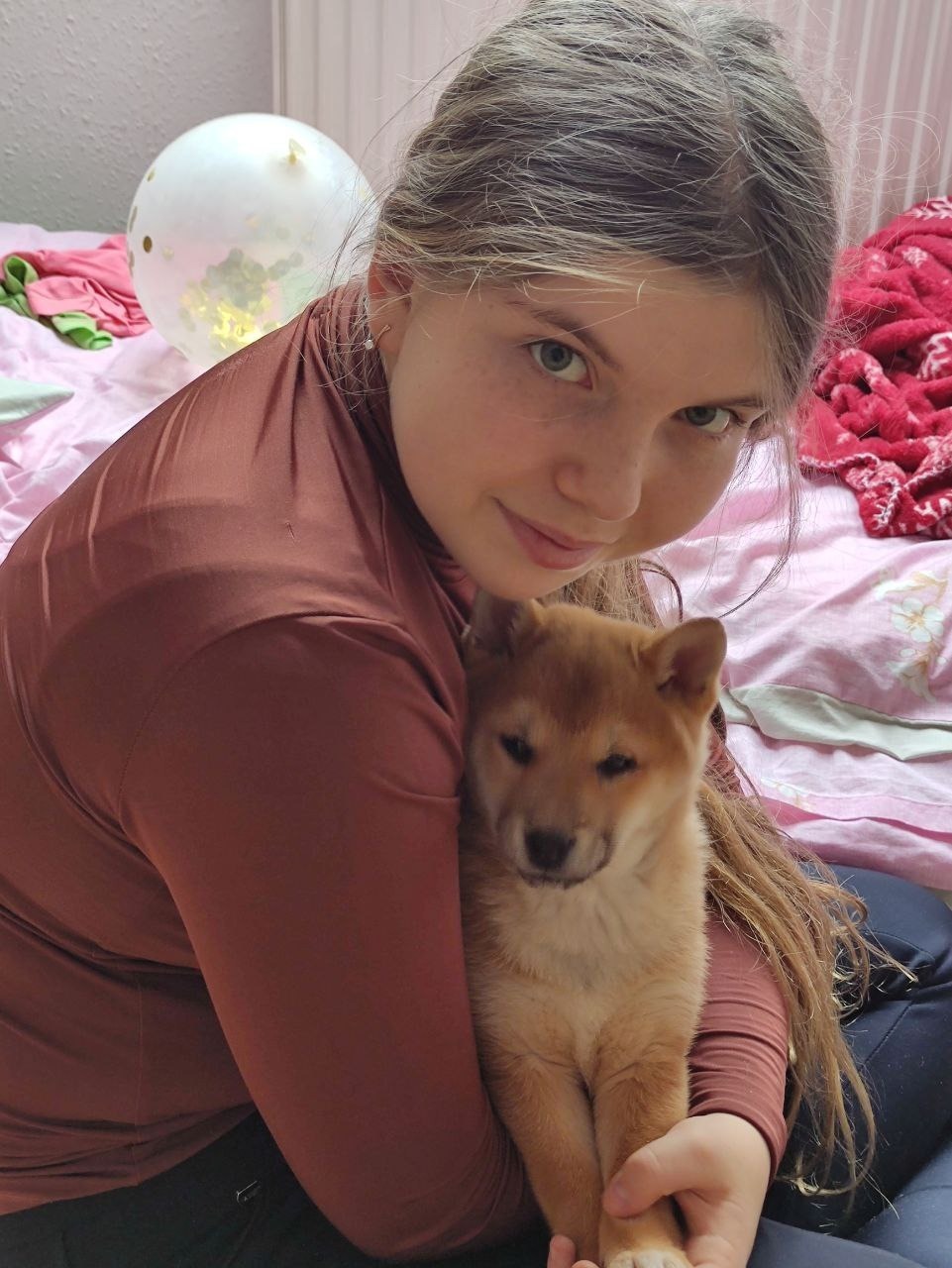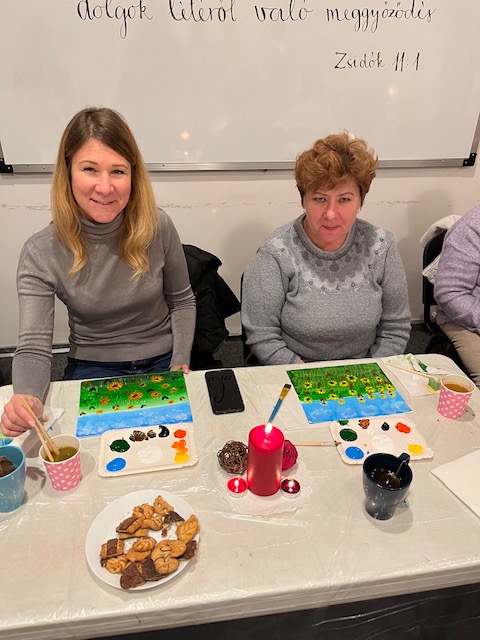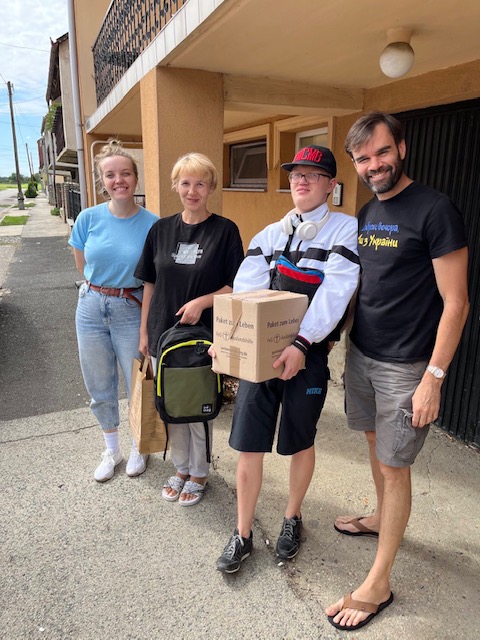By Sharon T. Markey

Svieta and her husband Ruslan had two daughters and lived in Mykolaiv, Ukraine. Svieta had a flourishing business as a specialty baker, and her husband installed swimming pools. For two years before the war, Svieta and her daughters had been attending an evangelical church in Mykolaiv. Under Svieta’s gentle urging, her husband went to church with them from time to time. It made a positive impression on him, but he considered himself a traditional Orthodox Christian and was not interested in his wife’s version of Christianity.
Mykolaiv is located in southern Ukraine, not far from Kherson, a major Ukrainian city that was captured by the Russians during the first week of the war. When the war started, Ruslan quickly realized that he needed to get his family to safety. He drove them to the Moldovan border where they said goodbye (shown above), and Svieta and her daughters continued on alone. What he didn’t tell his family was that he also felt a responsibility to defend his country from the Russian invaders. Once his girls were safe, Ruslan returned home and enlisted in the Ukrainian army. But before that happened, he made another life-changing decision. Influenced by his wife’s faith and the teaching he had heard at her church, he prayed to Jesus, asking Him to become his Savior and the Lord of his life.
From Moldova, Svieta and her daughters made their way to Budapest, Hungary because of better educational opportunities for the girls there. We met Svieta when she became part of a weekly Bible discussion group for refugees in Budapest. As we studied the Bible and prayed together, our small group really started to function as a church.
After he enlisted, Ruslan was quickly promoted to a position that put him in charge of a group of young soldiers. Ruslan felt a fatherly affection and responsibility for these men, calling them “my boys” in his conversations with Svieta. They were sent to fight near Kherson, where the determination and sacrifice of the Ukrainian army eventually liberated the city from the Russian occupiers. But tragically, every one of the young men under Ruslan’s command was killed. Ruslan was devastated by the loss and tormented by survivor’s guilt. Then nine months after he had escorted his family to safety, he was given military leave to go see them. Just days before that trip, he was in an auto accident. It was a head-on collision on an improvised military highway. He was killed instantly.
Stunned and grieving, Svieta and the girls tried to make preparations to return to Ukraine for the funeral. Our little Bible discussion group came around them in their hour of need, giving them money for travel expenses and helping them find train tickets. “I don’t know how I would have made it through without them,” Svieta said. “They are like family.”
Once in Ukraine, Svieta left her daughters with relatives in the southern port city of Odesa and continued on alone to the family’s home in Mykolaiv, where she was to collect her husband’s remains and transport them back to Odesa for burial. Though every moment in Mykolaiv was risky, she also wanted to go to their apartment to pack up some things she wanted to take back to Hungary, since she didn’t know if she’d ever get another chance. She knew she couldn’t waste any time. Rockets kept flying overhead. One even smashed into a neighboring apartment building while she was gathering the things she wanted from her apartment. When she entered their apartment, the first thing she saw was a carefully packed bag, filled with all her baking supplies. Her husband had prepared it to give to her at their planned reunion, a final love note, sent from beyond the grave.
The funeral took place in Odesa on the very day that the family was supposed to have been reunited. After they took care of all their affairs in Ukraine, we were able to pick up Svieta and her daughters and drive them back to Hungary. When they arrived back in Budapest, one of the ladies in the Bible discussion group had a big pot of borsch waiting for them, and other church friends spent time with them in their apartment, playing guitar and singing worship songs together. The following week, our little refugee church community held a memorial service for Ruslan, with Svieta and her daughters sharing their memories of the man who had been such a devoted and loving husband and father. There were tears, but there was also laughter, and the family expressed gratitude for the chance process their grief with a loving and supportive community.
The lives of these dear ladies will never be the same, but they are not giving into despair. They’ve added new life (in the form of an adorable puppy) to their family, and Svieta is preparing to start a baking business again. She also has another new venture. Inspired by how her Bible discussion group supported her and her family through their loss, she is on a mission to help us start similar groups for refugees in other cities around Hungary, so that no one will have to face their troubles alone and everyone can have an opportunity to meet the God who cares for the hurting.

By Sharon T. Markey
October 19, 2022
Today we met Andriy when he came to our apartment to get a can of sweetened condensed milk for his children. It’s a popular treat in Ukraine but very hard to find in Hungary. We recently got some from Ukraine and posted an announcement about it on a chat group for Ukrainian parents in Budapest. Within an hour, all 20 cans were spoken for, and Andriy was the first person to come claim one, which we were selling at cost.
Andriy is the father of a family from the Donetsk People’s Republic (DPR), one of the two break-away republics in Eastern Ukraine that had been the site of fighting between Russian-backed separatists and the Ukrainian army since 2014. Though Andriy and his family were pro-Ukraine, they chose to remain in their city after it became part of the DPR because it was their home. Prior to the Russian invasion on February 24, 2022, the family was coming under increasing pressure to relinquish their Ukrainian passports and get DPR documents, but they decided that, if it came down to it, they would leave the DPR before ever giving in.
After the Russian army occupied their city in February 2022, Andriy, his wife, and their two children (ages 6 and 7) hid in their home for three months. They finally managed to escape through Russia. Andriy was smuggled into Russia to avoid being taken by the occupiers. Once in Russia, the family made their way to the Latvian border and then continued on to Hungary, where Andriy’s sister had been living for several years. Andriy found a job, and the family is trying to rebuild their life. They don’t know if they will ever see their home again, but they are grateful to be together and to be safe.
By Sharon T. Markey
September 18, 2022
We met Grandmother Lena at a lunch for Ukrainian refugees that we catered at a church in Győr, Hungary. Grandmother Lena is from the city of Zaporizhzhia in Eastern Ukraine. Shelling, the possibility of a Russian takeover of the city, and the very real danger of shelling causing a major nuclear disaster at the nearby nuclear power plant all make Zaporizhzhia extremely unsafe. Grandmother Lena escaped to Hungary with her daughter and her daughter’s two sons, ages 1 and 13.
The daughter found work at a factory, and Grandmother Lena takes care of the baby during the day. The family shares two beds in a hostel. The daughter’s job provides her with one bed, and she pays half of her monthly salary for a second bed. The family barely manages to survive on the rest of her salary. Grandmother Lena says she needs to get a job to help make ends meet, but if she does, they will have to figure out child care. The groceries, toiletries, and school supplies we were able to give them seemed like an insignificant gesture in the face of the great difficulties they face.
A man from the church that hosted the lunch heard their story and said that they are paying too much for their lodgings. We pray that he will be able to help them find more affordable accommodations and that more locals will become aware of the plight of the refugees in their midst and will be moved to help.
By Sharon T. Markey
September 4, 2022
Today we went to the Hungarian city of Sárvár to distribute aid to a number of Ukrainian families living there.
One of the refugees we met was a lady named Tetiana. She is from Papasna, a Ukrainian city next to the Luhansk People’s Republic, one of two regions where Russian-backed separatists have been fighting the Ukrainian army since 2014.
Papasna came under heavy shelling early in the war, and Tetiana and her two children had to shelter in a basement for a month and a half. When the Ukrainian army was finally forced to retreat from the city, they discovered this family in their cellar hideout and helped them get safely out of the city. Eventually they ended up in Hungary, where they are trying to rebuild their life. Papasna has been destroyed, and they have no home to go back to.
Tetiana has a job in Sárvár assembling coffee makers, and her boss helped her find part of a house to rent. She asked her landlord if she could have a plot of land for gardening, and he gave her permission to use half of the backyard. Ukrainians love to garden, and she soon had a flourishing vegetable garden. Her landlord was so impressed that he told her to use the entire yard! Now she is sharing fresh produce with all the neighbors, enriching those around her, even though she has lost everything herself.
By Sharon T. Markey
During the spring of 2022, a group of courageous men from churches in a city in Eastern Ukraine were risking their lives to take aid into Mariupol and bring people out. The humanitarian situation in Mariupol was hellish. For weeks people had been living under constant shelling, without food or water, and with no place to bury their dead. When these men would arrive with food and water to distribute, the desperate people would almost be fighting over the supplies.
On one trip, after distributing the aid they had brought, they were loading up their vehicles with people to evacuate, and one man approached them with a wild look in his eyes. He had a pocket full of gold items that he was offering in exchange for them to drive about two miles to pick up his family and evacuate them. The drivers assured the desperate man that they would get his family—and told him they didn’t want his gold.
Once the drivers had gotten everyone safely out of Mariupol, they took these shell-shocked people to their church. The sign above the door read “People are More Valuable than Gold,” which is actually the name of the church. Inside there were tables with food set out on them. Amazed to see bread after weeks without it, the man with the pocket full of gold asked hesitantly if he could have some. “Of course!” they told him warmly, and he finally understood that everything—from his family’s rescue to the food before him—was free, a beautiful picture of the gospel.


